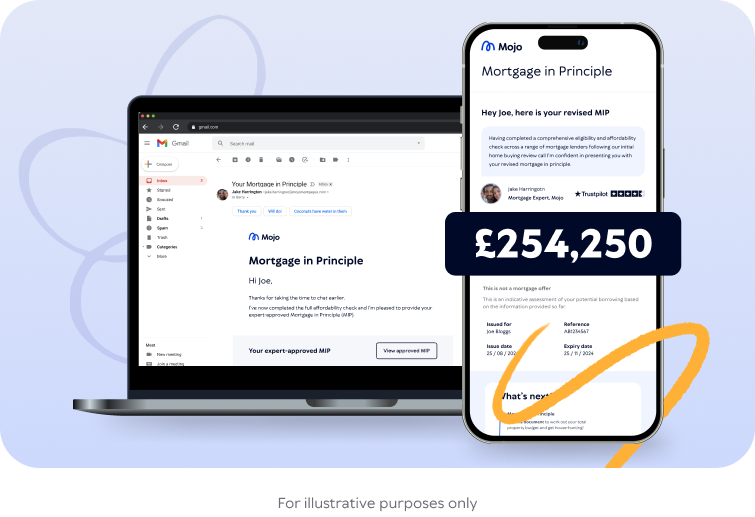How much deposit do you need for a house?
The amount you need to save for a house deposit depends mainly on the property’s value and how much your lender is willing to offer you. Most lenders ask for at least a 5% deposit, though it's typical for homeowners in the UK to put down a deposit of around 20%. Let's explore further...


Key deposit statistics
The minimum deposit required to buy a property in the UK is usually 5% - though you’ll be able to access better rates if you put down more than that
The average deposit size in the UK is £59,209 for first-time buyers
The average loan-to-value ratio for first-time buyers in the UK is 80%, with most opting to put down a 20% deposit
Unsurprisingly, London has the highest average deposit for first-time buyers in the UK, with those buying in Wales and the North East paying the smallest deposit
What deposit do you need for a mortgage?
Most mortgage lenders are likely to ask for a 5%-10% deposit. But you’re more likely to be able to access more favourable rates if you put down a larger deposit (for example, 20% or more).
The size of deposit you need depends on:
-
The property’s value
-
How much your lender is willing to offer you
-
Your lender’s minimum deposit requirements
-
The type of mortgage you’re looking for
-
The type of property you want to buy
-
Your financial circumstances and creditworthiness
-
Your chosen lender’s criteria
Fortunately, our mortgage deposit calculator can help take some of the guesswork out of this, and tell you exactly how much you'll need to put aside working towards your home purchase goal.
Your deposit determines your loan-to-value (LTV). This is essentially what percentage of your property’s value you borrow. For example, if you have a 20% deposit, your LTV will be 80% as you’re borrowing 80% of the property’s value. Typically speaking, the lower the LTV, the less of a risk for lenders which could help you access their best rates.
Why it’s best to save the largest deposit possible
It can be frustrating to wait until you have a large deposit to buy a home, but there are some major benefits to doing so:
-
Cheaper rates: A large deposit reduces the risk in lending to you by lowering your LTV, which can help you access the most competitive mortgage interest rates. Lower interest rates mean you’ll pay less interest over the duration of the mortgage
-
Lower mortgage payments. As you’ll be borrowing less money from the lender, your mortgage payments will be lower each month. Alternatively, you could opt to increase your monthly payments and shorten your term length to pay off your mortgage faster and save on interest costs overall
-
Greater buying options. Lenders won’t offer you an infinite loan amount - they’ll typically offer between 4 and 5 times your income. So, if your income isn’t quite large enough to secure your dream home, you may need to raise a bigger deposit to make up the difference
-
Less chance of negative equity: property values change all the time, so it’s perfectly possible to buy a home for, say £250,000 and it only be worth £245,000 in a few months’ time. If you’ve taken out a 100% mortgage, this would mean you’d end up in negative equity - which is where you owe more than your home’s current value. This can be problematic when you want to remortgage or move home
Of course, there are some disadvantages to waiting to save up too. For example, if house prices or interest rates increase significantly while you’re busy building up a deposit, any benefit you’d gain from a lower LTV mortgage could disappear.
Average first-time buyer deposit
So far this year, the average deposit size for first-time buyers is £59,209. It’s most common for first-time buyers to put down a 20% deposit, which might seem unusual given the range of low-deposit mortgage options on the market.
However, with interest rates still higher than they were in the early 2020s, it’s likely prospective homeowners are keen to get the most competitive rates. Saving for a greater deposit in order to apply for a lower LTV mortgage is a great way to access a lender’s better rates and therefore bring monthly mortgage payments down.
Region | Average loan size | Average property price | Average deposit | Average deposit % | Average LTV |
|---|---|---|---|---|---|
East Midlands | £177,023 | £214,330 | £37,307 | 17% | 83% |
East of England | £236,412 | £297,838 | £61,426 | 21% | 79% |
London | £351,978 | £462,694 | £110,716 | 24% | 76% |
North East | £171,369 | £199,959 | £28,590 | 14% | 86% |
North West | £179,191 | £216,412 | £37,221 | 17% | 83% |
Northern Ireland | £152,215 | £200,300 | £48,085 | 24% | 76% |
Scotland | £171,445 | £216,270 | £44,825 | 21% | 79% |
South East | £258,186 | £321,656 | £63,470 | 20% | 80% |
South West | £228,362 | £285,145 | £56,783 | 20% | 80% |
Wales | £164,425 | £191,284 | £26,859 | 14% | 86% |
West Midlands | £194,116 | £231,598 | £37,482 | 16% | 84% |
UK average | £234,292 | £293,501 | £59,209 | 20% | 80% |
House prices unsurprisingly make a big difference to the deposit size required for first-time buyers. Those in London are putting down the highest deposit size, given the average property price for a first-time buyer stands at a whopping £462,694. However, with stamp duty changes recently trimming first-time buyer relief to properties under £300,000, could we start to see London-based homeowners putting down a smaller deposit to account for a larger stamp duty bill?
Those in Wales and the North East not only put down the smallest deposit, but also the smallest deposit in relation to property value. The average homeowner puts down a 14% deposit in these areas, likely in a bid to get on the property ladder as soon as possible.
Interestingly, first-time buyers in Northern Ireland opt for a slightly larger deposit size - 24% of the property value on average - despite the average property price being comparable to other regions in the UK.
How long does it take a first-time buyer to save for a deposit?
It could take a first-time buyer 8 years and 10 months to save the average UK deposit size.
We took the average monthly salary in the UK (£2,546 after tax), and subtracted average monthly rent (£774) and average monthly household costs (£977) to discover typical monthly disposable income is £843. Presuming individuals can save two-thirds of that amount each month, predicted monthly savings for a deposit comes to £562.
Therefore, it would take eight years and ten months to save the average first-time buyer deposit of £59,209. That said, to achieve the minimum 5% deposit requirement (£14,675) for the average property price, it could take just two years and two months to save up.
Swifter savings can also be achieved by teaming up with a joint applicant. Two people buying together could be able to save twice as much each month, achieving the average deposit size in the UK within four years and five months.

Find out how much you could borrow
Kick-start your mortgage journey by getting a mortgage in principle, which gives you an idea of how much you could borrow.
Just tell us a bit more about you and the property you want to buy.
How much can I borrow?
Lenders typically determine your borrowing capacity by considering factors like your income (often lending 4-5 times your salary), outgoings, credit history, personal circumstances, and property type. Your deposit size, which affects the loan-to-value, is also crucial.
If the property's price exceeds what a lender will offer you, you'll need to cover the difference with a larger deposit.
A deposit saving calculator can give you a quick idea of how much of a deposit you'll in order to buy a house. Or, for a more personalised result, get a mortgage in principle.
How much will I need to save?
To get an idea of how much you need to save, take a look at the house prices in your desired area. Once you know how much your ideal property will cost and how much a lender might offer you, you can work out how much money you need to put down as your deposit.
For example, if a £250,000 home requires a minimum 5% deposit, you'd need to save at least £12,500. But if your lender is only willing to let you borrow £200,000, you’ll need to put up at least £50,000 to make up the difference.

“Consider your future finances when deciding how much you’ll need to save, too. It can be tempting to plough every last penny into your deposit but moving house - and life, generally - can be expensive and unexpected. Make sure you have enough money in your emergency fund to cover you for the future.”
Luke Butcher, Chief Revenue Officer
How does deposit size impact my monthly mortgage payments?
A bigger deposit reduces your loan size, and therefore the amount of interest you’ll pay on the total borrowing amount. So, your repayments are likely to be smaller too because you don’t need to pay as much money back (with as much interest) each month.
For example, looking at a mortgage on a £300,000 property with a 25-year loan term at a 4.5% interest rate, you could save £417 each month just by borrowing £75,000 less. And that’s not even taking into account the lower rates you might be offered by opting for a lower LTV mortgage.
Deposit (%) | Deposit size | Estimated monthly repayments |
|---|---|---|
5% | £15,000 | £1,584 |
10% | £30,000 | £1,501 |
15% | £45,000 | £1,417 |
20% | £60,000 | £1,334 |
25% | £75,000 | £1,251 |
30% | £90,000 | £1,167 |
*Calculated using the Mojo mortgage calculator, based on a £300,000 property with a 25-year loan term.
About different deposit sizes
Low loan-to-value mortgages (under 80%)
Most lenders consider anything lower than 80% a good or low loan-to-value ratio. This means you’re investing in 20% or more of the value of your property immediately, which is considered much less risky amongst lenders.
You may therefore be able to access more competitive rates by putting down at least a 20% deposit.
5% deposit mortgages (95% LTV mortgages)
Some mortgage providers are willing to lend up to 95% of the property’s value. There are even a few home ownership schemes out there to help, including Deposit Unlock for new build homes.
However, a 95% LTV mortgage is still seen as higher-risk lending. So you’ll usually need to have a stable income and good credit history to qualify.
It’s also important to consider that you’d get access to more competitive interest rates if you reduce your loan to value ratio with a larger deposit.
Zero deposit mortgages
100% mortgages are not very common in today’s market, although there are a few products available that allow buyers to take out a mortgage without a deposit. The vast majority of these products are only available for those buyers who are assisted by parents or other family members, however.
There are a couple of 0% deposit mortgage on the market, including the Track Record mortgage from Skipton Building Society. This uses proof of your rental payments as an indication of your ability to maintain mortgage repayments (though you’ll need to meet other eligibility criteria to apply, too).
Family-assisted mortgages and guarantor mortgages
These mortgage products are both intended for those who struggle to raise a deposit for their first home, and those on lower incomes who struggle to meet mortgage affordability assessments. With a guarantor mortgage, a family member provides security for a loan and agrees to pay your mortgage if you aren’t able to. A family-assisted mortgage works in a similar way, though the specifics and criteria can vary between lenders.
Make sure you discuss these options in detail with whoever you’re planning to ask for help before you look into this type of mortgage option more thoroughly.
There are plenty of ways for you to save up for a house deposit. Simple but effective ways to save include setting up a Direct Debit into your savings account to make sure saving becomes a habit, or you could turn to budgeting apps to help you manage your money.
If you’re under 40, The LISA (Lifetime ISA) savings account set up by the government can help speed up your deposit savings. They top up your savings by 25%, up to a maximum of £1000 per year.
But that’s just the beginning. We've compiled a list of clever strategies to help you save for a house deposit more quickly.
Many lenders require a larger deposit for a new build property, usually around 15%. This may seem counter-intuitive given that a new property is typically in better repair. However, because the value of a new build falls more quickly and dramatically than an older property, lenders see them as a higher risk purchase. Deposit Unlock is a scheme that allows you to buy a new build home with just a 5% deposit, though this is only available via participating developers and lenders.
Because of the higher deposit requirement, a lot of home builders offer certain incentives to customers buying a new home, such as a discount or cash bonus, which can be used to balance some of the additional deposit requirement. Make sure your lender is aware of any incentives offered, though, as they may adjust how much they’re willing to lend you as a result.
If you’re a landlord, or hoping to become one, you’ll usually need to provide a 25% deposit for a buy-to-let mortgage. On average, our buy-to-let mortgage applicants put down a 32% deposit when buying a rental property.
Some lenders may require up to a 40% deposit for investment property purchase, however, especially if you’re a portfolio landlord. It’s also not unheard of to be offered 80% to 85% loan-to-value mortgages for buy-to-let properties.
This can help you to purchase investment properties sooner, however, keep in mind it will also push up the cost of the interest charged.
Yes, as the deposit amount is usually just the percentage of the share you’re buying rather than the full property value.
You may need to put down a bigger deposit if you have bad credit, though it will depend on your individual circumstances. Generally, lenders see applicants with bad credit as a higher risk. A larger deposit may mitigate some of these concerns as you’ll be borrowing a smaller percentage of the property’s value, which reduces the lender’s financial risk.
Being able to save a large deposit could also demonstrate you’re financially savvy and responsible, which could help to offset some of the concerns around less-than-perfect financial behaviour in the past.
While this might technically be possible, you will struggle to find a loan provider willing to lend for this purpose and a mortgage lender willing to accept this form of deposit.
There might be slightly more flexibility if you only have to borrow money to top up your deposit. But, even if you are able to find a mortgage lender prepared to accept it, they’ll consider you a high risk applicant, which will push up the interest rates they’re willing to offer you.
Most lenders will accept a deposit that’s been given as a gift. However, you’ll need the person providing it to sign a gifted declaration. This simply confirms to the mortgage lender that it’s a gift, rather than a loan.
If inheritance tax law applies to the person gifting the deposit, they must survive for seven years after providing the gift. Otherwise it’s possible you’ll be liable for inheritance tax when they pass away.
You will transfer the funds for your deposit to your conveyancer or solicitor, who will then send the money to the seller’s conveyancer. Your mortgage lender needs to see proof of your deposit for your application to go ahead, but they don’t actually have anything to do with handling or transferring deposit money.

Our mortgage brokers can guide you through your options
There are various mortgage types available from different lenders, and it can be tricky to know which option is right for you. Allow our expert mortgage advisors to support you. They’ll get to know you and your circumstances, so they can recommend the most suitable options.
*All data taken from Mojo Mortgages’ internal customer data, with 2025 stats covering the period from 1 January 2025 to 24 April 2025